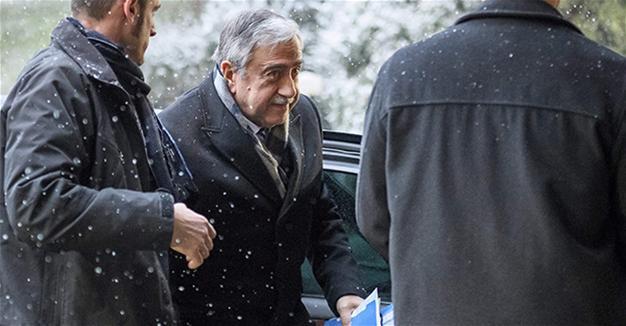Turkey seeks free movement of people, goods in Turkish Cyprus in post-agreement era
ANKARA

AFP photo
Turkey will seek the right of free movement for Turkish people and Turkish goods in Turkish Cyprus after a prospective reunification deal that would result in the entire island joining the European Union amid ongoing talks between Turkish and Greek Cypriots in Geneva.“The EU should not stay outside of these talks. They cheated the Turkish Cypriots in 2004. We told them not to do it this time. If there is going to be a solution, if Turkish and Greek Cypriots will jointly be members of the EU, then the EU should take four-party freedoms into consideration,” PM Binali Yıldırım told Turkish envoys on Jan. 10.
Yıldırım said Turkey would also seek the right to the free movement of its people and its goods in Turkish Cyprus in order to continue Turkey’s access to the united island. “This would also stand as an example of our accession to the EU,” he said.
There is progress in ongoing talks between Turkish and Greek Cypriots but what concerns Turkey is providing a guarantee for a just and equal governance system, he said.
“Mutual trust between two parties is not sufficient. Everything must be taken under guarantee in the light of the painful experiences of the past.”
The Greek Cypriot side has been a member of the EU since 2004, while the Turkish Cypriot administration was not granted the same rights. The EU vows to take all of the island once a deal is reached.
Turkey wants the continuation of its guarantor rights and to maintain the presence of a certain number of troops on the island while Greece and Greek Cypriots reject it.
“The guarantor for the Turkish Cypriot side is Turkey and for the Greek Cypriots, it is Greece,” he said, repeating Ankara’s wishes for a just and lasting solution for a bi-communal federation state with a rotating presidency.
Leaders set to present maps
Yıldırım’s comments came as the two leaders of the eastern Mediterranean island, Turkish Cypriot President Mustafa Akıncı and his Greek Cypriot counterpart, Nicos Anastasiades, met in Geneva on the second day of U.N.-brokered peace talks on Jan. 10.
While the property, and governance and power-sharing chapters were negotiated on the first day of the peace talks on Jan. 9, governance and power-sharing, economy and the European Union chapters were discussed on the second day, state-run Anadolu Agency reported.
It also said the parties had exchanged their views over the security and guaranties chapter on the first day.
On Jan. 11, the two sides are expected to present their respective maps for the internal boundaries of a future federation.
From Jan. 12, a five-party conference on Cyprus is scheduled to be convened with the added participation of the guarantor powers of Turkey, Greece and Britain.
The island has been divided since 1974 when Turkey intervened in the northern part of Cyprus after a coup aimed at unification with Greece.
U.N. special envoy for Cyprus Espen Barth Eide told reporters in Geneva on Jan. 9 that a reunification deal was “difficult but possible.”
Eide said the Geneva talks had made a good start, but acknowledged that while most issues had been resolved, some of “the most complicated or most emotional issues” remained.
“This is going to be difficult,” he said. But he added: “It is possible... I don’t know any issue in these negotiations that really cannot be solved if sufficient will is available.”
He also said that they were at “the final moment.”
“We are now in the final moment. We are now really at the moment of truth,” Eide said.
Erdoğan, Tsipras discuss Cyprus talks on phone
Meanwhile, on Jan. 9, Turkish President Recep Tayyip Erdoğan and Greek Prime Minister Alexis Tsipras exchanged views on the Cyprus peace talks in a phone conversation, according to a statement issued by the Turkish presidency, state-run Anadolu Agency reported.
The two leaders pointed out the importance of having a constructive attitude for all sides in order to attain a positive result from the negotiations in Geneva, said the statement.
Erdogan and Tsipras agreed the coming talks in Geneva could be an important opportunity for reaching a settlement.
“Concerning the process, the Greek prime minister expressed the view to the Turkish president that he will travel to Geneva only if it is apparent there is the possibility of a deal,” a Greek government official said, according to Reuters.
“The two agreed to reassess the situation on the eve of the conference,” the official said.
















